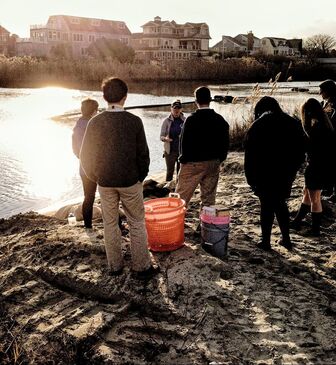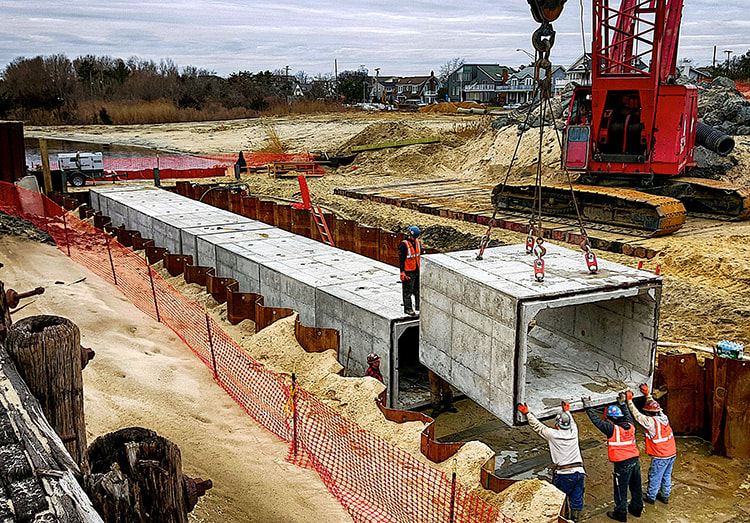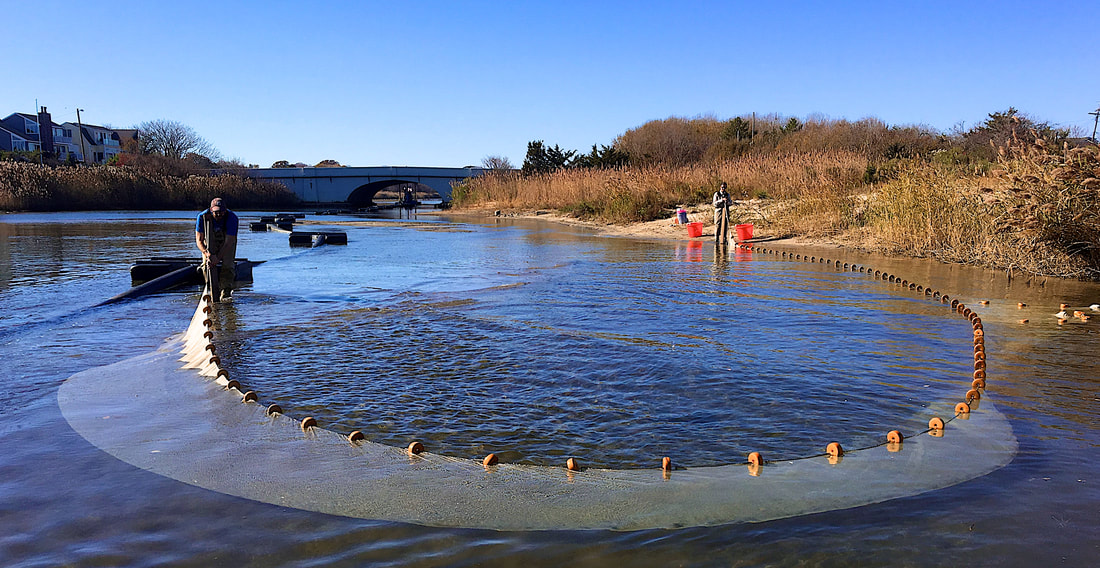|
The American Littoral Society is paying tribute to tributaries in March because many of our projects focus on the waters that feed the bays and coastal areas which have been the cornerstone of the Society’s mission for the past 60 years. Tributaries are as critical to an ecosystem as the respiratory system is to the human body. In addition to moving nutrients, sediment and other organic material throughout a watershed – that area of land that drains all the streams and rainfall to a common outlet – they serve as important habitat for numerous species. Unfortunately, these vital systems are often at high risk in the United States, due to the adverse effects of encroaching development and contaminated stormwater runoff. Situated along the Jersey shore between Spring Lake and Sea Girt Borough is Wreck Pond, a 73-acre tidally influenced coastal pond within the twelve-square-mile Wreck Pond Brook Watershed. Fed by three main tributaries, Wreck Pond drains water from these municipalities and four neighboring townships into the Atlantic Ocean.  Coastal bodies of water, such as Wreck Pond, essentially act like lungs of an ecosystem, with their tributaries serving like airways. In an unaltered state, as the ocean tide rises and falls, water moves into and out of the pond, helping to flush out toxins while bringing new nutrients to the watershed. However, in New Jersey these “lungs” are often restricted due to outfall pipes, incised culverts, and other impediments. Decades ago, to allow for development around Wreck Pond, the natural coastal inlet was replaced with a pipe. The result was greatly decreased tidal flushing, which allowed pollution to build up and increased the likelihood of flooding, while impeding the access of migrating fish species to their natural spawning grounds. When the “airways” accumulate contaminants that the restricted “lungs” cannot flush out, the system as whole declines. The Wreck Pond Brook Watershed once flourished with river herring, a species of fish that lives in the ocean but return to freshwater tributaries to lay eggs. Coupled with over-fishing, the change from open inlet to outfall pipe has dramatically reduced the number of these anadromous fish that return to the coastal lake and its upstream tributaries. To address these issues, not only for river herring, but for the whole Wreck Pond ecosystem, the American Littoral Society partnered with state and local agencies, neighboring communities, and other partners for a major restoration project. In 2015, a 600-foot fish passage was installed between Wreck Pond and Atlantic Ocean. This box culvert was designed to not only provide a better connection between Wreck Pond and the Atlantic Ocean for fish but to improve tidal flushing, reduce risk of flood, and improve water quality. Since the installation of the fish passage, Society staff have monitored river herring within the watershed and can now report that there has been a clear increase in migratory species abundance within the coastal lake. Still, once these species enter Wreck Pond, their journey to suitable spawning habitat is far from over. As they swim upstream, river herring face many other impediments, like fallen trees, waterway debris, and the Old Mill Pond Dam. To address the latter issue, in September 2020, the Society installed a fish ladder at Old Mill Dam. The ladder provides a path fish can swim over the dam and opens access to an additional one mile of suitable spawning habitat. With the box culvert and the fish ladder installed, these species have a greater chance at spawning success, and therefore, the potential to increase their population size over time. To gauge the success of the work, the Littoral Society conducts fish surveys, tracks the movement of herring throughout the water body with electronic tags, measures water velocity and tidal changes, and manages a community science monitoring program to engage people from the surrounding communities with the ongoing restoration project. The effort to enhance Wreck Pond and its feeder streams is a great tribute to tributaries and lesson about the importance of creating healthy ecosystem. Re-opening the airways of Wreck Pond has involved the hands of many, but benefited river herring and all of the other creatures that live within the watershed.
Mike
3/2/2021 12:10:24 pm
I agree that the project's outcome to increase in freshwater/saltwater interface (free flowing access from and to the ocean) allows for anadromous fish to return and reduces inland flooding that results from failed local planning that allowed unsustainable impervious surfaces. I find the pollution improvement argument in the story questionable, however. Moving the impoundment accumulated pollution to the ocean is not a benefit to the ocean, especially the shoreline. Until the point and nonpoint pollution sources in those 6 watershed communities are identified and eliminated, the connected environment will not improve. If bioaccumulating chemicals are still leaching into the watershed, they will accumulate in the herring and subsequently those natural predators of the herring, hawks, eagles, bluefish, striped bass, whales and porpoises. We should not promote that increased flushing of pollution out to the ocean is a goal of those committed to protecting the environment. 3/2/2021 12:37:09 pm
The American Littoral Society has long been directly involved in efforts to reduce the amount and types of pollution going into waterways, through lobbying, legislation, and public education. Tidal flushing has always been a natural phenomena that has been interrupted in this case by human intervention. Improving the watershed's habitat and reducing flooding in the communities around Wreck Pond can't be accomplished without fixing the flushing issue. Moreover, it isn't really possible to keep the pollutants in the pond. Eventually, weather events occur - like Superstorm Sandy or a random N'oreaster - occur, and everything in the pond ends up in the ocean anyway. While we would love to solve the problem of pollution, whether it be from geese, cars, corporations or putting too much fertilizer on lawns/fields, we can't postpone restoration of natural habitats until after pollution ceases to be an issue. We have to take the opportunities where we find them, while continuing to work on the related issues in the hope that we will eventually reach that great day when people stop carelessly poisoning the planet. Comments are closed.
|
Archives
July 2024
Categories
All
|



